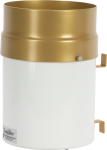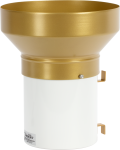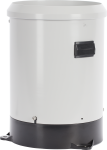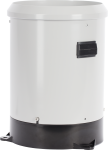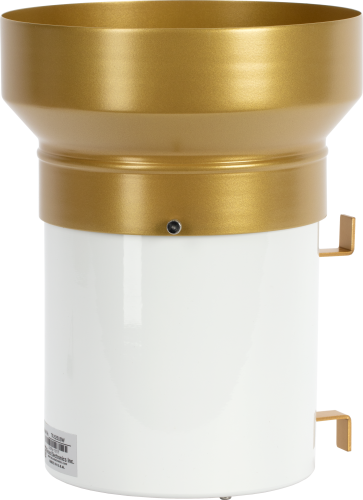






Visão Geral
The TE525WS, manufactured by Texas Electronics, is a tipping bucket rain gage that conforms to the National Weather Service recommendation for an 8 in. funnel orifice. It measures rainfall in 0.01 in. increments. This tipping bucket is compatible with all Campbell Scientific data loggers, and it is widely used in environmental monitoring applications.
Leia maisBenefícios e Características
- Compatible with most Campbell Scientific data loggers
- Accuracy is ±1 percent at rates up to 1 in./hr
- High precision—tips at 0.01-in. increments
- Directly compatible with the CS705 Snowfall Adapter allowing the TE525WS to measure the measure the water content of snow
- Conforms to the National Weather Service recommendation for an 8-inch funnel orifice
- Compatible with the CWS900-series interfaces, allowing it to be used in a wireless sensor network
imagens

Descrição Técnica
The TE525WS funnels precipitation into a bucket mechanism that tips when filled to its calibrated level. A magnet attached to the tipping mechanism actuates a switch as the bucket tips. The momentary switch closure is counted by the pulse-counting circuitry of our data loggers.
Compatibilidade
Mounting
The TE525WS rain gage mounts to a CM300-series Mounting Pole or a user-supplied 1.5” IPS pole. Several pedestal options are available to secure a CM300-series pole to the ground (see Ordering Information). Accurate measurements require the gage to be level.
Snowfall Adapter
The TE525WS is directly compatible with the CS705 Snowfall Conversion Adapter. The CS705 uses PG:E antifreeze to melt snow, allowing the TE525WS to measure the water content of snow.
Wind Screen
Campbell Scientific offers the 260-953 Wind Screen to help minimize the affect of wind on the rain measurements. This wind screen consists of 32 leaves that hang freely and swing as the wind moves past them.
Especificações
| Sensor Type | Tipping bucket with magnetic reed switch |
| Material | Anodized aluminum |
| Operating Temperature Range | 0° to 50°C |
| Resolution | 1 tip |
| Volume per Tip | 8.24 ml/tip (0.28 fl. oz/tip) |
| Rainfall per Tip | 0.254 mm (0.01 in.) |
| Measurement Uncertainty | 1.0% up to 50 mm/h (2 in./h) |
| Cable Type | 2-conductor shielded |
| Orifice Diameter | 20.3 cm (8 in.) |
| Dimensions | 21 x 21 x 26.7 cm) (8.25 x 8.25 x 10.5 in.) |
| Cable Weight | 0.1 kg (0.2 lb) per 3.05 m (10 ft) length |
| Tipping Bucket Weight | 1.0 kg (2.2 lb) |
Documentos Relacionados
Videos & Tutoriais
Perguntas Frequentes Relacionadas
Number of FAQs related to TE525WS-L: 6
Expandir todosRecolher todos
-
A TE525-L can be converted to a TE525MM-L and vice versa because the inner tipping mechanisms are the same. To convert a TE525-L or TE525MM-L to a TE525WS-L, the rain gage must be sent in to Campbell Scientific to change the tipping mechanism. If an 8 inch funnel is used on a TE525-L or TE525MM-L without changing the tipping mechanism, the multipliers for the rain measurement will change. For information about these multipliers, see the TE525 Instruction Manual.
-
The 260-953 Alter-type rain gage wind screen consists of 32 heavy metal leaves that hang freely and swing as the wind moves past them. The swinging leaves act as a wind damper and help minimize the effect of wind on the rain measurements without adding additional turbulence.
-
Not enough tips or too many tips.
-
The most common errors are either that the rain gage appears to have drifted out of calibration or that the tips are not being correctly recorded by the data logger.
-
When a rain gage is out of calibration, it is usually because of the buildup of dirt and grime on the internal surfaces of the tipping bucket mechanism. Cleaning the internal surfaces usually brings the rain gage back into calibration. It is also possible that a rain gage is out of calibration because it is no longer level.
To minimize the possible occurrence of calibration errors, perform routine cleaning and maintenance of the rain gage at least once every three months. The environmental conditions at a particular site may require a facility to perform cleaning, leveling, and maintenance on a much more frequent schedule.
-
To incorporate a sensor that is compatible with wireless sensor interfaces into a wireless network, a CWS900-series wireless sensor interface is needed, as well as an A205 CWS-to-PC interface to configure it.
Estudos de Caso
Southwestern South Africa had three consecutive dry winters—from 2015 through 2017—resulting in the Cape Town......Leia mais
The city of Frisco, Texas, sits in an area that experienced severe drought from about......Leia mais
Currently, the Andean tropical glaciers are in an accelerated process of retreat. These glaciers are......Leia mais
The Geography Department at Bucknell University has implemented a weather station to obtain meteorological data......Leia mais
